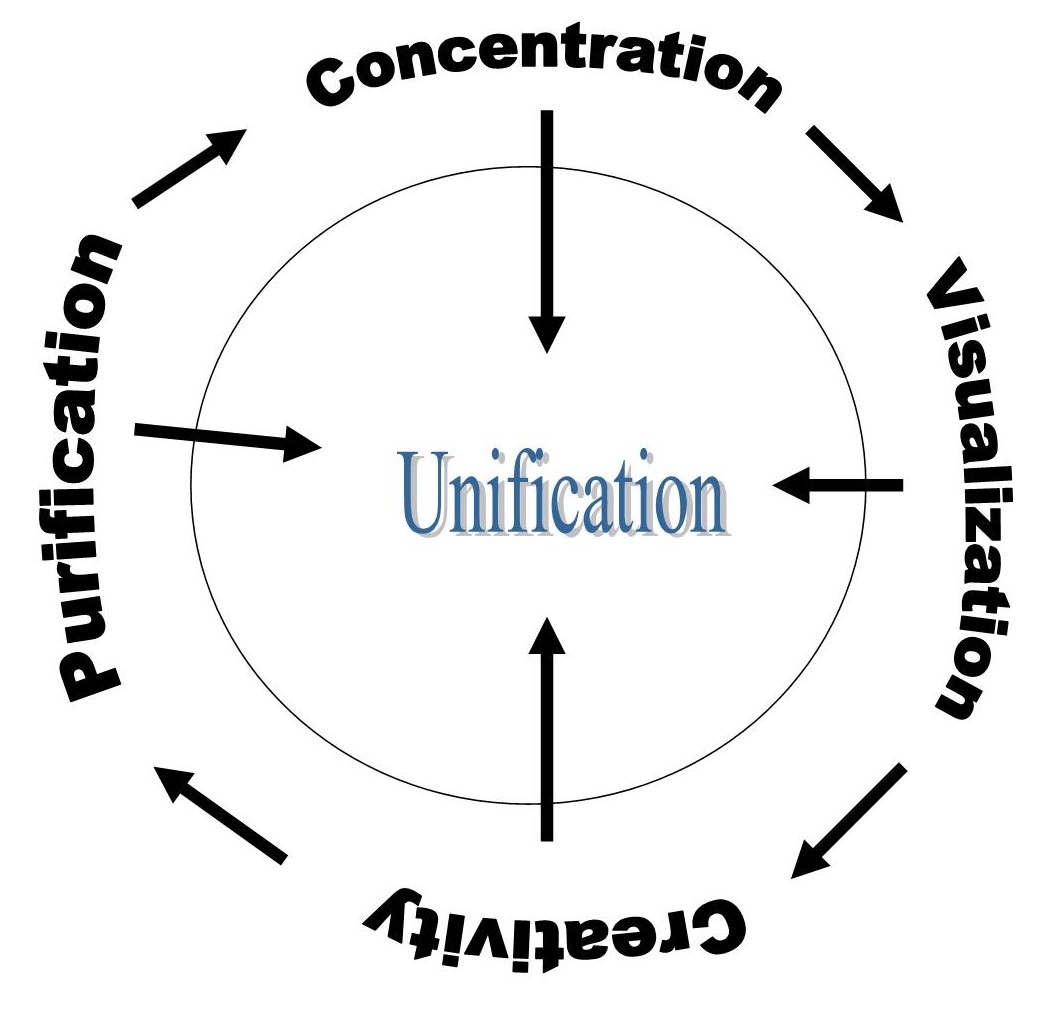Incubation Stage Needs Stimulating Ambiance and Spirituality
The incubation stage requires a rich environment, contentment in nature, and varied surroundings conducive to motivational thinking and open up the spirit. In the incubation stage, you will reprogram your consciousness to align with nature, not the pressures of society. A barren, institutionalized ambiance suggests a barren, institutional way of thinking. Conduct your incubation stage among trees, in a desert, or beside a mountain creek to feel closer to our origins and the natural “us.”
Research suggests that we lose motivation as we witness the despoiling of the natural world with each highway through a national park and each shopping center where a meadow once existed. Research by Washington University professor Peter H. Kahn suggests that ecological destruction is one of the causes of our increasing rate of depressive illness. Equally, Prof. Kahn says, evidence suggests that depression can be alleviated if we become involved in animal rescue or the preservation of our natural home. Bringing plants into our office or home or sharing a communal pet will lift our mood. That is why we strongly suggest you experiment with your incubation stage while vacationing or taking a break.
Professor Mihaly Csikszentmihalyi, in his book Creativity, says it best: “So the reason Martha’s Vineyard, the Grand Tetons, or the Big Sur may stimulate creativity is that they present such novel and complex sensory experiences—mainly visual ones, but also birdsong, water, and the feel of the air—that one’s attention is jolted out of its customary grooves and seduced to follow the novel and attractive patterns. However, the sensory menu does not require a full investment of attention; enough psychic energy is left free to pursue, subconsciously, the problematic content that requires a creative formulation.”
Jack Kornfield describes: Into the Woods “We don’t know all the reasons that propel us on a spiritual journey, but somehow our life compels us to go. Something in us knows that we are not just here to toil at our work. There is a mysterious pull to remember. What takes us out of our homes and into the dark of Baba Yaga’s forest can be a combination of events. It can be a longing from childhood or an ‘accidental’ encounter with a spiritual book or figure. Sometimes something in us awakens when we travel to a foreign culture, and the exotic world of new rhythms, fragrances, colors, and activities catapults us out of our usual sense of reality. Sometimes it is as simple as walking in the blue-green mountains or hearing choral music so beautiful that it seems inspired by the gods.” (After the Ecstasy, the Laundry: How the Heart Grows Wise on the Spiritual Path)
We strongly suggest you incorporate some rituals and spirituality into most activities. We are all neurologically wired for spirituality. Research confirms that deep spirituality is the basis for enduring happiness. Spirituality is a deep understanding of how to commune with, or even rely on, something greater than ourselves. For some people, spirituality is more like motivation and a sense of purpose.
Incubation Stage Might Benefit from a Mentor
If you are leaving for vacation, meditation, or even prayer to incubate, take a smart friend or a mentor with you. We become demotivated, pessimistic, apathetic, and even physically ill when our relationships are dysfunctional. A friend or mentor can point this out to us. Each of us is capable of forming truly supportive, healing relationships. The incubation stage is a good place to achieve that. Research led by assistant professor Lan Brissette of Rutgers University confirms that we can set up the conditions for motivation by surrounding ourselves with a tribe or band of supportive people.
Jack Kornfield adds: The Community of the Sacred “The community of the sacred is revered in Judaism as the minyan, the minimum number of Jews needed for a prayer service. It is the sacred communion of the Sufis, the satsang of Hinduism, and the holy Christian love ‘whenever two or more are gathered in His name.’ However it may be expressed, true community is central to spiritual life.”
Learning Dance or Anything on Your Own Learning on your own is the most challenging and joyous experience you might have. The best way to learn is to break down the large task so that whatever the task, you will be able to do it, and from doing it, you will get greater powers with which to do the next task. Try to use mindfulness to get feedback for yourself with heightened attention. Heightened attention helps you make a correction, show yourself the difference between what you did and what you were supposed to do, and learn how to close that difference. Most importantly, by doing this, you will achieve a higher state of heightened awareness. You will achieve your own mind-body awareness, from which you will in time get your own instructions, feedback, and correction. Heightened attention allows you to achieve greater control over your own behavior.
The Advanced View of Incubation Stage: The Concept of ‘Default Positive Mood’
The human brain is apparently designed to offer a positive frame of mind, which includes the principles of ‘strain avoidance’ and ‘reward harvesting’ (Diener and Lucas, 1999; Lykken, 2000).
In support of this concept, several studies infer that, when basic needs are met, most people enjoy life and tend to be optimistic and motivated. There is also an argument favoring this notion based on the evolutionary perspective. A motivated state of mind is more likely to persuade the individual to participate in procreation and life-supporting functions. The idea that a positive mood can improve fitness and thus offer a biological advantage is unfortunately losing the state of ‘default positive mood’ may be one of the more typical consequences of a discordant life situation, and even the presence of ample reward-eliciting stimuli may be insufficient to compensate for this deprivation. A variety of techniques, such as various forms of meditation and yoga, are presumably aimed at returning the individual to the default positive mood and nurturing this state of mind. The incubation stage is about engaging the mind in tasks that are expected to promote motivation and happiness by instigating positive child-like feelings through expanded observations.
Incubation stages like yoga and meditation are forms of techniques designed particularly for motivation and child-like reprogramming of innate skills, self-esteem, and competency.
Incubation Stage as a Meditative Technique: Contacting the Self Within You
These are the concepts of finding Virtue, concentration, and insights (the path to mindfulness) to gradually rekindle the inner strength, skills, and competency within you; visualization and imagination; and the most satisfying of all, unification or connection.
So far in this chapter, we have defined some basic necessities to create a successful incubation stage. Now we are going to focus on what we should do and practice in the incubation stage.
Search your mind for an unmapped mental territory. When we say unmapped, we refer to a part of your mind that is untapped. This is the part that can achieve a sense of greater intuitive harmony. You must also leave your analytical mind behind. You will not need it here.
Here are a couple of examples. Have you ever tried a new dance, chess, rock climbing, tennis, or singing? The part of your mind that craves to try that dance or any new, challenging activity is untapped territory. You have never tried rollerblading. You have never tried yoga. There are many parts of your mind that are untapped. Try to use your childlike observations to find more of these territories.
Try to bring moral purity to this unmapped new territory in your mind. What do we mean by moral purity? These are activities that will give you a feeling of purity and dignity. For example, if you decide on yoga, then think of it as a holy or virtuous experience, which it truly is.
Finding virtue also means freeing your mind from worrisome matters; in the same manner, do not think of greed, hate, anger, or delusions. Think of finding virtue to bring your mind to a state that is unconcerned with externals, calm, and ripe for new joyful experiences. I must emphasize two keywords: joyful and enjoyment. If your new activity is not joyful or enjoyable, you will have a harder time achieving what we would like to achieve, which is the feeling of a concept called Flow.
To fully benefit from your incubation stage, you must develop strong attention and fully notice your sensory perceptions, not allowing them to stimulate your mind into thought chains of reaction. You must learn to focus on your passion to the point of paying sensory stimuli only the barest attention.
If this incubation stage is set for yogic meditation, extinguish all the extrinsic motives and distractions. Distractions could be ill will, anger, despair, worry, laziness, discursive thoughts, agitation, doubt, or skepticism. Try to concentrate on your new passion. The goal of concentration is to focus your thoughts on a single subject, which is your new passion. At the height of your concentration, your new passion is the only object that occupies your mind; your mind must sink into the passion and remain fixed in it. Exercise visualization and imagination; try to see the final outcome in your mind.
While you are trying to concentrate, search for moments of insight. Insight is seeing things as they are. Try to combine noblification, or finding virtue, concentration, insights, imagination, and visualization all at the same time. Each of these qualities will help to improve the others. Strong noblification or finding virtue makes concentration and visualization better, and strong concentration makes noblification or finding virtue and insights better. Think of a circle or spiral where these qualities strengthen each other around the circle. At this stage, you will not hear negative thoughts. This is the stage at which you have broken off any negative feelings you might have had about anything. You will feel a new deep tranquility—a total break with normal consciousness. At this stage, you can be more creative.
Remember our mind map: Noblification or finding virtue → Concentration → Imagination (Visualization) + Learning Goal-Oriented + Hard Work + Creativity → Unification (Connection) We believe this mind map is more like a spiral where all elements strengthen each other. That means the more noblification or finding virtue, the more imagination and concentration, the more noblification or finding virtue, and the more visualization.

